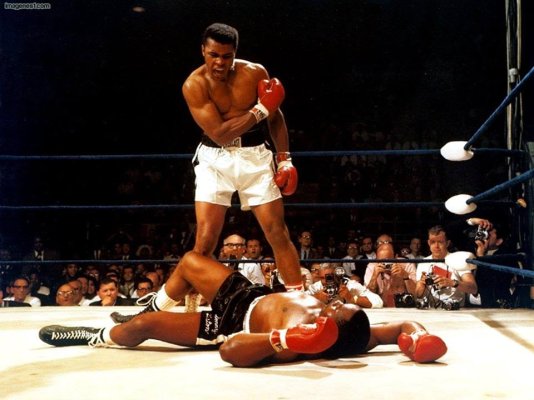I was not a fan when he was still fighting, because of his brash, oversized personality.
I wished Liston had beaten him though by the time I first heard of him, Ali had had his epic fights, both wins against Liston and one or both fights against Frazier.
I didn't appreciate the poetry of his self-promotion and the promotion of the legendary fights. His rhymes were memorable and no doubt inspired many but for some reason, they contributed to my perception of him as a cocky, taunting jerk.
Instead I thought Frazier's story was more inspirational and his low-key demeanor seemed more deserving of admiration.
I distinctly recall Ali mocking Frazier and other opponents for being boring or slow or not pretty like him.
Among all the reactions to his passing, a lot of young black star athletes talk about how inspirational he was to them and the one reason repeatedly cited is that Ali spoke up for what he believed in.
But I'm not sure they're referring to the biggest issue that Ali is known for, his refusal to report for service and go serve in Vietnam. Was it this refusal that which inspired generations of people or was it Ali's overall irrepressible, brash demeanor?
And would Ali be the inspirational figure if he didn't beat Frazier and especially Foreman? People talk about his influence and significance beyond his feats in the ring but if he lost those big, legendary fights, would he have had the same political and cultural impact?
As I said before, I didn't like the larger than life personality that he cultivated. The people who took up this mantle of cockiness and braggadocio were not boxers who followed him or even the superstar black NFL and NBA players. It was instead superstar rappers who churned out hits bragging about their sexual prowess and their material wealth who best exemplify the Ali persona in the late 20th and early 21st century popular culture.
On the other hand, Ali's bravery, his apparent willingness to challenge the orthodoxy which led this country to an unjust and unpopular war seems heroic. It's certainly more admirable than superstar athletes who appear only to be concerned about making the most money. You wouldn't think Michael Jordan, Tiger Woods, Lebron James or other figures of similar stature would risk taking stances like the very public refusal by Ali to be inducted into the Selective Service, because the megastars of today wouldn't risk losing the lucrative endorsements and sponsorships which bring them tens or even hundreds of millions a year.
Then again, you suspect they'd find a way to avoid service even if we had conscription.
But I wonder, was Ali's stance purely one of conscience or did he simply believe he could avoid it without paying the consequences?
Did he know that he'd be stripped of his titles and be prevented from fighting for 3-4 years, in his prime?
He certainly wasn't meek when he was expressing his conscience. He talked of his unwillingness to fight "slave masters" in their war against "dark-skinned people."
I haven't read biographies so I don't know if he was genuine in expressing his conscientious objector status or he was gambling that he could refuse to serve and get away with it due to his fame.
Because what happened to individuals who refused to serve? How easy or difficult was it to get an exemption due to religious beliefs? Didn't men typically get incarcerated unless they were able to convince the draft board?
Certainly Ali inspired many others who objected to the war as well as well as young African-Americans who saw a black star take an heroic political stand.
Ali also was an inspiration to the Civil Rights movement but he doesn't seem to have gone in any marches or make a lot of statements about the movement. Certainly there was overlap between the Civil Rights and anti war movements which might explain why those fighting for Civil Rights in the 60s gravitated to Ali.
 .
.


